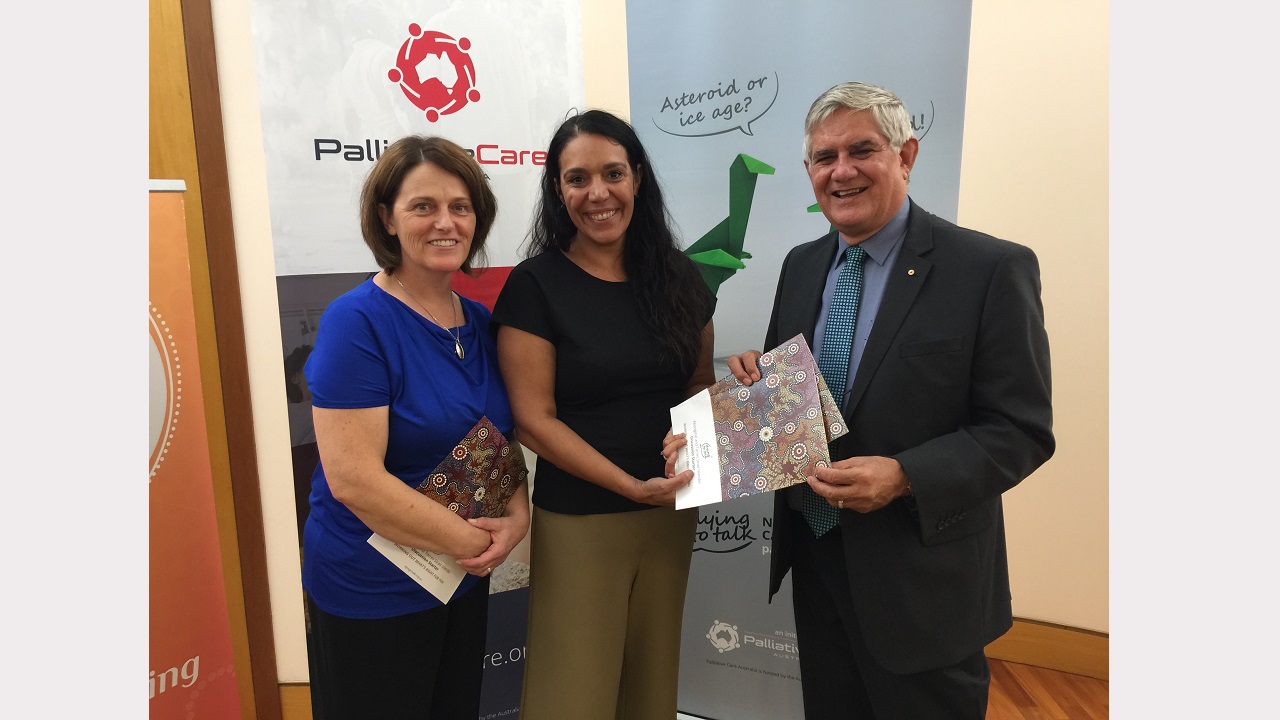New resources help Aboriginal and Torres Strait Islander people talk about end-of-life care
New resources help Aboriginal and Torres Strait Islander people talk about end-of-life care
by Heather Wiseman
Tuesday, March 28, 2017
“Death is hard. It brings us grief. But I think the other side of grief is when we know that we’ve met the wishes of a loved one.”
Such was the wisdom offered today by Minister for Indigenous Health, Ken Wyatt, as he launched new resources designed to help Aboriginal and Torres Strait Islander people discuss end-of-life care wishes with their families or health care teams.
Mr Wyatt said he was impressed with the quality of thought underpinning the Dying to Talk resources, which would “ease people gently into the discussions that we need to have”. He described the approach as being “helpful, constructive and compassionate”.
The resources include a set of cards, each printed with a statement, which healthcare workers can use to facilitate discussion with individuals or groups. Also launched was a culturally appropriate version of the Dying to Talk Discussion Starter. Among questions about family, possessions and health care, it asks about the importance of visiting country if you were sick and not going to get better, or being on country when you die.
Mr Wyatt congratulated the organisations that collaborated to develop the “invaluable” resources: Palliative Care Australia, the Congress of Aboriginal and Torres Strait Islander Nurses and Midwives, The Indigenous Allied Health Australia and the Australian Indigenous Doctors’ Association.
“Your step-by-step guide will make those difficult discussions about death a little bit easier. It is structured, it’s succinct and it’s clear.”
During the launch, Dr Wyatt reflected on what he had learned while working as an undertaker and talking with relatives of people who had died. Often they said they had never discussed death and so didn’t know what their loved one had wanted. They wished they had had this important discussion, or taken the time to listen when their loved one had asked to talk about death.
“It was a salient experience and taught me to live life fully on a day-by-day basis, but to also have a long term plan as to where I wanted to go to. And that is why talking about death is important. Because you can signal your intentions but at the same time prepare your family for the event whenever it does occur, because we are all mortal.”
PCA CEO Liz Callaghan said the original Dying to Talk Discussion Starter was launched in 2016. The new culturally appropriate resources were developed after consultations with Indigenous health organisations that identified the need for a specific resource for Aboriginal and Torres Strait Islander people.
“The Aboriginal and Torres Strait Islander specific resources have been developed to support advance care planning and end-of-life discussions,” Ms Callaghan said.
“Focus groups were held with Aboriginal and Torres Strait Islander people to understand what barriers they had in discussing their end-of-life care wishes and planning for death. Those focus groups informed the design and content of the Discussion Starter and the Dying to Talk Cards to ensure they were culturally safe and useful.”
Development of the new resources was funded by the Australian Government. They will be distributed across Australia, to Aboriginal Health Services and Aboriginal Medical Services. The Discussion Starter can be downloaded from http://dyingtotalk.org.au/aboriginal-torres-strait-islander-discussion-starter/.
The resources feature artwork by Indigenous artist, Allan Sumner. The artwork conveys the journey of palliative care patients over the course of their lives, reflecting memories, loved ones, what is important, and what they have done and achieved.
